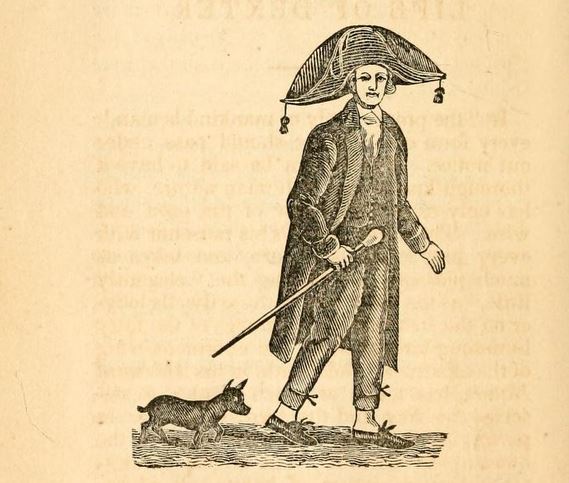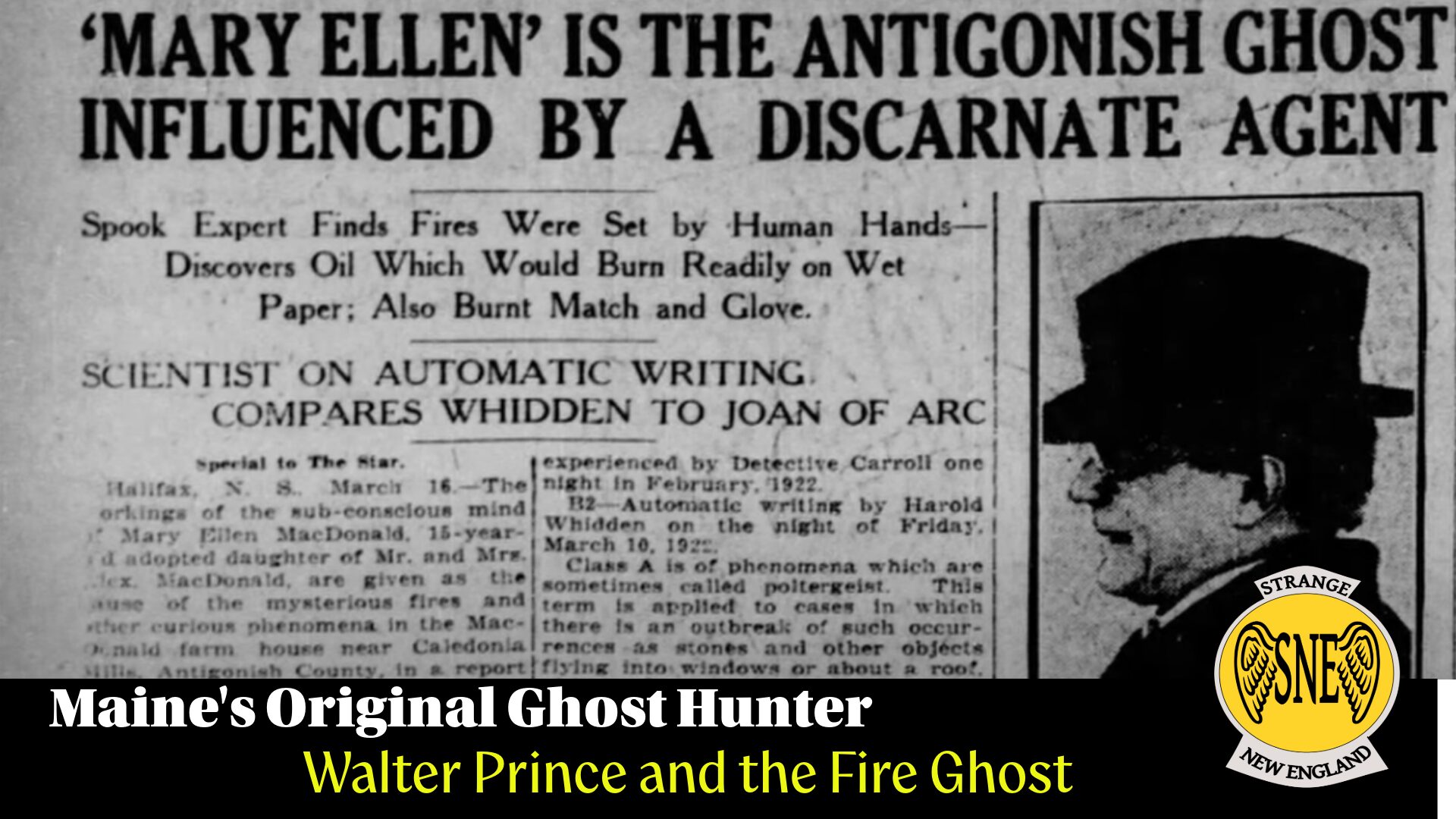
Have you ever known an extremely lucky person, a character so unlikely to be successful due to a perceived lack of wit, money, talent, and education as to be the poster boy for failure? Still, they thrive and persevere against all that the hand of Fate has set against them, perhaps in spite of it all. These people are not as uncommon as it might seem and their success is as strange a thing as we encounter in our daily, sometimes mundane life.
Such is the case with one of New England’s most interesting and nearly forgotten characters, the unlikely success known to the world as Timothy Dexter. Born in Maiden, Massachusetts in 1748, Dexter did not have the benefit of an education. By the time he was eight years old he was working on a local farm until the age of sixteen when he apprenticed out to a leather-dresser, coloring and preparing leather for working after the hides had been tanned. When he was twenty-one, the unlikely young man made his way to Newburyport in Massachusetts. Such was the simple fate of a simple man, to gain enough training to make his way in the world, to put a roof over his head and food in his belly. He had no connections. He was not a gentleman. He was a workman with a trade with no formal education and no hope of riches. In pre-revolutionary America, people rarely rose above their station unless they were helped by very connected friends or if, and here the point is clear, they were very, very lucky.
Perhaps the first great piece of luck Dexter found was to marry well. Though he had little to offer her except his peculiar outlook upon the world and his abundant energy, the rich widow Elizabeth Frothingham married him. Together, they bought their first mansion and he began to consort with the wealthy of Newburyport. We are not sure what his contemporaries thought of him, but it is safe to assume that it is likely this unlearned, unlettered young man was ignored or even given bad advice to discourage him from being ‘uppity’ in the company of the elite. After all, he had no experience with the sycophantic and highly stylized banter that the wealthy of the colony employed as their common tongue. Dexter was a simple, down-to-earth man who was more at home with the servants in his mansion, than he was with his white-wigged neighbors.
Perhaps it was his unorthodox view of the world that helped Timothy Dexter beat the odds and rise far above the ranks of the wealthy of Newburyport at the time. During the war, Dexter managed to hold onto his wife’s fortune. After the American Revolution commenced and British currency was difficult to procure, the Continental Congress issued its own script, known as Continentals. The new currency ran from 1/6 of a dollar to an $80 bill. All told, the Continental Congress issued a total of over $240,000,000 by the end of the war. During the war, the script became less and less valuable until a famous addage came into ciruclation – that something was ‘not worth a continental.’ With little gold to back the paper, many did not believe it was worth the paper it was printed on.
Except for Timothy Dexter. At war’s end, Dexter did something few other patriotic rich men were willing to do: he purchased large amounts of the ‘worthless’ currency, trading good money in for bad. Nearly everyone would have considered this a terrible financial move. As time passed, however, and the new American government began to gain solid ground financially, it made good on its promise to make the continentals worth something. Dexter profited from his purchase and made enough money to build two of his own ships and begin his own export business to the West Indies and to Europe.
There is a saying that some still use, that something silly is like ‘shipping coal to Newcastle,” which is a city in England that already has plenty of coal in abundance. No one would actually send coal to a coal center to sell unless they were out of their minds. But Timothy Dexter did just that. We do not know if he was aware that there was a coal shortage in Newcastle because of a miners strike: the time it took for a voyage to and from England to Newburyport was long and a strike might well have been over by the time his ship arrived, but it wasn’t and Dexter shipped coal to Newcastle and made a good profit on the deal. When the first chain bridge over the Merriamack River was built, Timothy Dexter invested heavily in it. Many at the time thought such a thing unlikely to last and only a few investors were ever found in the first place. But the bridge was a success and offered Dexter a divided of twenty-five cents on the dollar for every year that passed.
Warming pans are heavy brass pans with covers on the end of long wooden poles that go under the mattress and keep those in the grip of a harsh New England winter rather cozy in their beds. Why anyone would ship a boatload of these items to the West Indies requires a great deal of incredulity, but there was Timothy Dexter, who did just that. His competitors must have thought him a fool for such a venture, but Dexter laughed all the way to the bank when the molasses distillers purchased them, took the pin out that held the two brass pans together and made two excellent brass ladles out of each singular warming pan, two for the price of one. He followed this strange transaction up with a boatload of mittens to the West Indies, which were quickly purchased by merchants from Asia who had their own boats heading west to Siberia. Later he sent a boatload of gloves to the South Sea Islands, arriving just in time to sell them to a cadre of Portuguese merchants headed for China and Japan.
Other odd and unaccountable adventures ensured and no matter what he set his lucky hands to, he always rose wealthier and more successful than before, much to the chagrin of those who were bound and determined that one day, this man’s luck would surely run out. As a Newburyport merchant, he had connections with the huge American whaling industry whose whale oil businesses kept the lights burning in most of America and Europe. What remained from these behemoths was bone, and a lot of it, particularly from baleen whales. Their mouths offered veritable forests of thin, flexible bone used to filter water and contain the small fish and krill that the giants consumed. Dexter decided to purchase this excess of whalebone without knowing what he could do with it. Most of it was simply dumped into the sea, but Dexter warehoused it, spending a considerable sum to do so. Who could have known that the vagaries of fashion and the introduction of the ladies corset would soon demand tons of this baleen whalebone to use in stiffening the garments to hold in the waistlines and squeeze the inner organs of so many fashionable American and European women. Perhaps Timothy Dexter knew, because he sold all of his whalebone and then some.
Perhaps Dexter will be most remembered for making a profit from the thousands of stray cats that he gathered from the New England cities and then shipped to South Sea Islands in his fleet to sell to islanders who were already suffering from rat infestations originally caused by visiting American and European vessels in the first place. He even anticipated the need for Bibles and made a good profit on the word of God as meaningful missionaries to the East Indies frantically searched for multiple copies of the good book to lay into the hands of the newly baptized natives so that they might learn of the glory of the Lord. Timothy Dexter made that possible, too.
At a time when other merchants from his area spent their money investing in sure things, Dexter made his fortune by bucking trends and trying new things, taking great risks so that he could reap great rewards. Tensions among the elite of Newburyport grew and he and his wife were ostracized from their company. Dexter tried to fit in and perhaps that was his only piece of bad luck, because it didn’t work. He did not attend the Presbyterian Church or wear leather breeches. He was a humble worker, a craftsman at best, who happened to marry well and whose unusual world view made him seem the fool when in fact, he was wise. He purchased a mansion and attempted to live like the landed gentry, but no one came to his parties and he wasn’t invited to theirs. His family life began to suffer because as a father and a husband he was a good provider, but he was a bad hand at romancing the neighbors. First, he told visitors, presumably not the wealthy ones, that his wife had died and that was why she did not come down to mingle. In fact, she was alive and well. Later, he faked his own demise and then those who loved him, admired him, or simply wanted to make sure he was dead, came to his wake. Over three thousand people showed up.
Dexter continued to thrive. He purchased another estate in New Hampshire, away from those who despised him, and there at the age of fifty, he wrote a book entitled, “A Pickle for the Knowing Ones or Plain Truth in a Homespun Dress.” However, there was no punctuation in the book. What rules of grammar that many writers learned, Dexter did not know, or perhaps he simply didn’t care. In the book, he told the readers about the problems with politicans, the church and of course, his dear non-dead wife. Even this attempt at publishing seemed likely to fail but Dexter was successful again. Though he began by simply giving his oddly non-punctuated book away, demand for it grew. People couldn’t get enough of it. In his second edition, Dexter winks at the world by adding thirteen lines to the original text – all periods. He told his readers to put the periods where they liked – it was all the same to him. The book was reprinted eight more times.
Though others laughed at him and made him the butt of their joke, he had the last laugh. Timothy Dexter came to represent the kind of bold individual who rose from the lowest rank of American society to achieve greatness based upon nothing but his own decisions and foolhardy luck. He was a jester, the harlequin whose plain sense and odd idiosyncrasies set him apart from the old aristocracy and blazed a new path for the sons of more humble men to follow. Timothy Dexter remains one of the luckiest men from old New England.
Sources
The Reader’s Digest Book of Strange Stories, Amazing Facts. Reader’s Digest Association. 1975. p. 501.
Online version of “A Pickle for the Knowing Ones”




